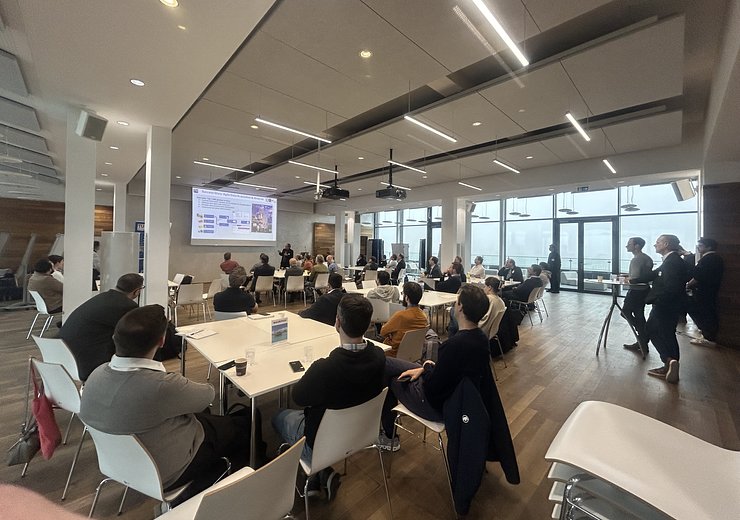Understanding and Improving Processes with Data Analysis and AI
On February 13, our experts shared valuable insights on how Data Analysis and AI can help understand and improve processes.

Picture: TU Wien Informatics
On February 13, the workshop “Understanding and Improving Processes with Data Analysis and AI” took place at TUtheSky. More than 40 participants from the fields of healthcare, production, process consulting, funding agencies, ministries, and administration came together to attend the workshop, including both clients and quality assurance officers for data analysis and AI projects. The goal of the workshop was to present ways and methods that make industry processes more resilient, as well as to develop, validate, and scale efficient data analysis and AI applications. The workshop was organized by TU Wien Informatics and TU Wien’s FÖWI (Funding Support & Industry Relations).
The workshop began with a welcome address from the organizers, followed by keynote presentations that demonstrated how data analysis can improve processes, using real-world industry examples. Keynote speakers were Stefan Biffl (Institute of Information Systems Engineering, ISE), Stefan Fenz (ISE), Clemens Heitzinger (ISE, Director of CAIML), Kristof Meixner (ISE), Sebastian Kropatschek (Excellence Center for Digital Production (CDP), and Dietmar Winkler (ISE, CDP).
In the second part, participants were introduced to the procan.do method and its practical applications. Guided by experts, they worked in small groups to gain a deeper understanding of specific production processes. The task was to address a production issue—waste generated during the process—by analyzing available data, identifying gaps, and examining the resources and processes within an existing network. Participants were asked to reflect on questions such as: Do we have data to determine whether this is a real issue or just an outlier? The workshop aimed to help participants better understand their organization’s processes, break down information silos and apply shared knowledge to solve specific production challenges.
procan.do is a structured method that helps to gain a clear overview of important deviations in production processes, to identify necessary domain expertise, understand systems and their influence on the process, and link information silos in a targeted way. The resulting process image enables efficient data analysis and supports the development of AI applications. procan.do makes it possible to see at an early stage how feasible a project is, which success and risk factors need to be considered, and where potential blind spots in quality assurance exist. The method thus bridges the gap between data analysis and the underlying data and its quality. It not only helps people to better understand processes but also supports machines in efficiently developing data-based solutions. procan.do builds on established standard procedures that have often been applied in isolation up to now. The method is designed so that non-experts (ages 14 and up) can actively participate without prior knowledge or domain expertise.
Curious about procan.do?
Experts from our Institute for Information Systems Engineering advise organizations on implementing procan.do and adapt information systems from research for practical use. This makes it possible to identify and eliminate blind spots in processes, making them more resilient, as well as to develop, validate, and scale efficient data analysis and AI applications. Find out more about procan.do.
Curious about our other news? Subscribe to our news feed, calendar, or newsletter, or follow us on social media.








